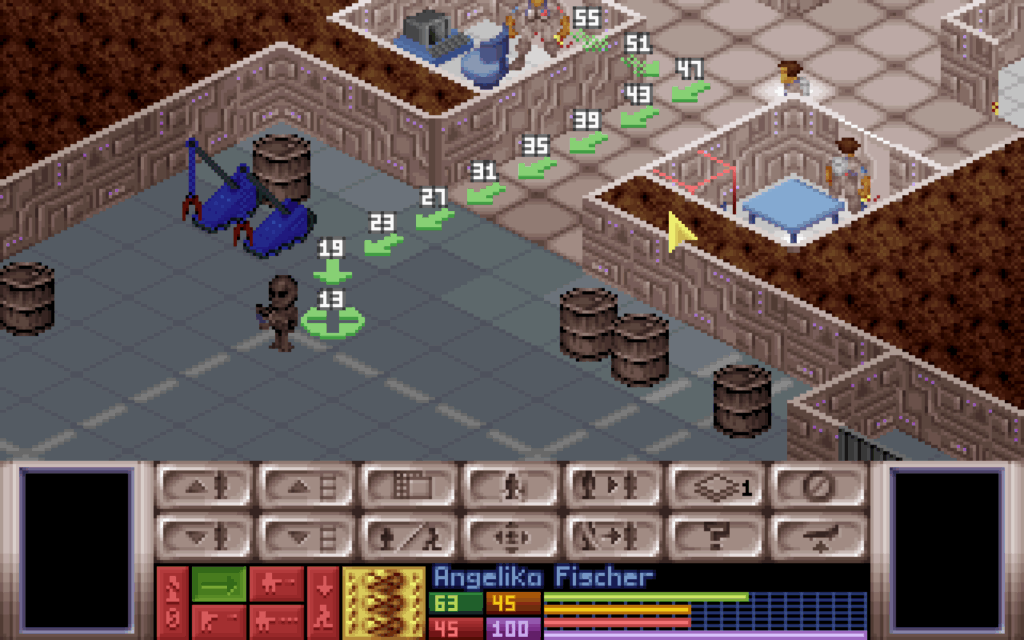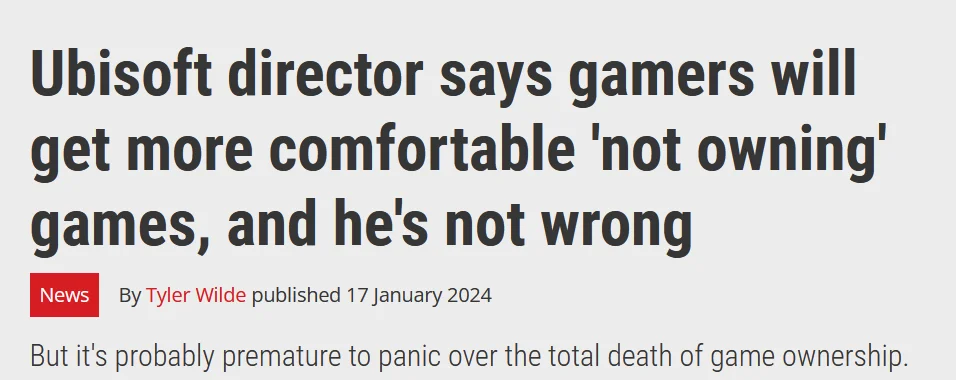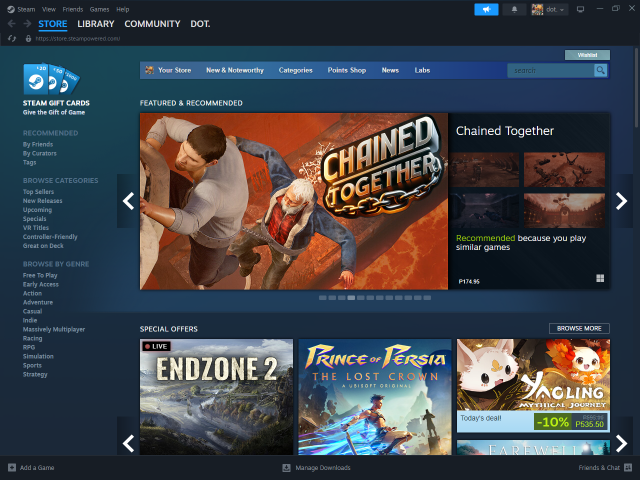I watched as Windows shut down and the computer restarted. The familiar Windows didn’t appear once it booted up. Instead a black screen with some white text ending with C:>. My fingers tapped on the keyboard. A blue screen appeared asking for sound card settings. I spent time making sure they were correct. Then I hit enter…
Disclaimer
Before I get into this I want to acknowledge that I do see piracy as a crime. Generally I dislike the idea that artists who created something not getting the recognition and compensation they deserve. This article is meant as a story of events that happened, not as a justification for piracy.
PC Gaming in the 90s
When I was in school I discovered a game called UFO: Enemy Unknown. When I got it working I was met with an violent introductory movie, and the start of one of the best strategy games of all time. I couldn’t stop playing it, but it would eventually end up being hard to get a copy that worked.
Getting UFO: Enemy Unknown1 running in the 90s required a bit of extra knowledge. You couldn’t just download it, install it, and run it like you do with modern games. Like many games of the era, you couldn’t even run it in Windows.
Instead, you would have to restart your computer and run it in “DOS mode”. Then you would have to configure settings based on your hardware, usually to do with your sound card. Once all this was done, you could finally start your game.

It was a laborious process but, to me at least, it was worth it. I played so many games for the first time this way, including UFO: Defense, Grand Theft Auto, and Cannon Fodder. There were so many good games to discover if you just put a bit of effort in.
Of course, as you know, things got better. Hardware advanced at an accelerating rate. DirectX and OpenGL provided libraries that made it much easier to write games that would run in Windows. It wasn’t long before playing a game was as simple as putting a disk in a CD player.
Unfortunately, many of those games weren’t updated. They were left behind, unplayable in Windows 95 and beyond like other games. You couldn’t buy them anymore. They had been abandoned.
The Age of Abandonware
Abandonware, as it was called, are games that have been abandoned by their publishers and/or developers. Though piracy is illegal and arguably immoral, many people felt that abandonware was fair game since they aren’t stealing any profit from anyone. And as long as no one files a Cease and Desist or presses charges, it may as well be legal. Even to this day there are websites dedicated to hosting abandonware.2
UFO became one of those abandonware games. And I wanted to keep playing it. The trouble was getting it running on PCs as they became more advanced became even harder. Some games didn’t take into account that hardware would get faster, so ran at lightning speed. Other games couldn’t run in the latest version of DOS. Hell, even restarting a machine at the command prompt was becoming a thing of the past.
It was always easy to find a copy of the game on pirating sites. But to run games like UFO you also needed an emulator. Emulators where software that would pretend to be another machine or operating system. So an emulator could pretend to be a NES console, allowing you to play NES games within the program. They were in a grey area, legally. Technically they weren’t illegal since they didn’t ship with any games, but almost everyone knew where to find the ROMs containing the games.
DOSBox was a piece of software that would emulate older versions of DOS and allow you to run it within Windows. For me, this meant that I could find a copy of UFO, and run it again. It wasn’t without it’s challenges, however. To do so, I would have to dig through a bunch of archaic settings to ensure the virtual sound card was set up correctly, and run some commands to get it running.
And then, just as I resigned myself to endless config headaches, along came a platform that would change everything.
Competing with Free
One day I’m browsing a new platform called Steam and I see X-COM: UFO Defense listed for sale. In fact, they have all of the old X-COM games for sale. And they’re really cheap. I figured it would be worth the price to own a legal copy of the game, so they became the first ever games I bought on the platform.
Even better than that, I found that I could play the game as soon as it was downloaded. It still used DOSBox under the hood, but all the configuration was done for you. No messing around with the install or running command line tools. Just click “Launch” and it launches like any other modern game.
On Steam, games are usually affordable, you can often play them on multiple platforms, and you get to keep them forever. And while it does use DRM, the DRM is unobtrusive and only prevents you from being able to play in the rarest of situations. Platforms like Good Old Games go even further by not even implementing DRM in the products they sell.
These platforms weren’t competing with each other. They were competing with free. Not only that, pirated games were often more convenient, as they would remove DRM restrictions, such as needing the CD in the computer to play, or requiring an always-on internet for a single player game.
One of the disadvantages of piracy is that you don’t know if the executable you’ve downloaded contains malicious code or viruses. Free is never without risk. Steam, GOG, and their ilk fought this by providing a better service. Affordable games, minimal/no DRM, you get to keep them in your collection, and they come from a company that’s more trustworthy than someone with a name like L33TH4X0R_69.
I’ve been using Steam as my main gaming platform ever since. I’ve ended up owning so many games that it’s taken me nearly 2 years to play through less than 15% of my library. At this rate, I’ll finish my library sometime in the 2050s
While I’m not going to say that piracy is dead thanks to these platforms, I do strongly believe that piracy has been massively reduced. By providing a convenient way for people to own, collect, and play games, less people will be inclined towards privacy.
The New Wave of Piracy
Lately I’ve noticed a rise in posts about piracy, and I think there are a few reasons for this. First, there’s been a rise in AAA titles using invasive DRM, from requiring phone number registration, to effectively installing root kits on machine. People don’t want to play games like this, so they look elsewhere.
Another reason is other companies attempting to start their own launchers. They have had varying levels of success, though none have reached the same level as Steam. I believe the root cause for this is that their motivation is wrong. Unlike Steam or GOG which are trying to provide a good service for their users, the other launchers are trying to pull users into a closed ecosystem where they can push more games and products on them.
Then there is a shift into the idea of games being a “service” rather than a “product.” Companies are attempting to make players used to the idea that they don’t own their games. The tongue-in-cheek response has been that “if buying isn’t owning, then piracy isn’t stealing.”

You can see a similar shift with streaming platforms. It was great when it was just a few, but now every studio seems to have their own streaming service. And people don’t own anything on those services. You can be half way through an old series, only to find the platform has decided to remove it. You can’t own a movie or a series anymore, you can only rent it or stream it.
This lack of ownership is, I think, the crux of the problem. When I was younger everyone had collections. Videotapes of movies, cassettes full of music, stacks of game cartridges. This kept on going with DVDs, then on to Blurays. People could buy and own things that they liked. As a game developer I know how much humans like to collect things, and that only works if you have a sense of ownership.
Steam, GOG, et al. all know this, and they have been so successful by making their customers feel like they own their games. Whether it be through DRM-free downloads, or through a well developed library with minimal DRM, players feel like they own their games, like they have a collection.
I always wonder how different media would look if streaming platforms switched to a Steam-like model, where you could buy a TV series or a movie and own it indefinitely. There would be much less justification for piracy if you can own a digital copy legally.
Unfortunately, in these days of streaming, it feels like both games companies and media producers are repeating the mistakes of the past. They are pushing people back toward piracy as their services cannot compete with “free”. The only way companies could fight back would be to let people collect and own things again.
If platforms give us back our collections, then maybe they will be able to compete with “free” once again.





